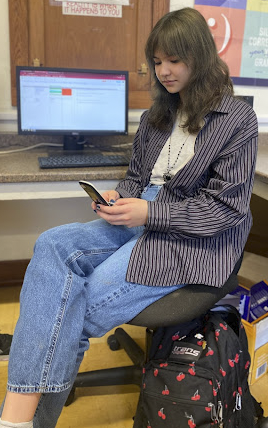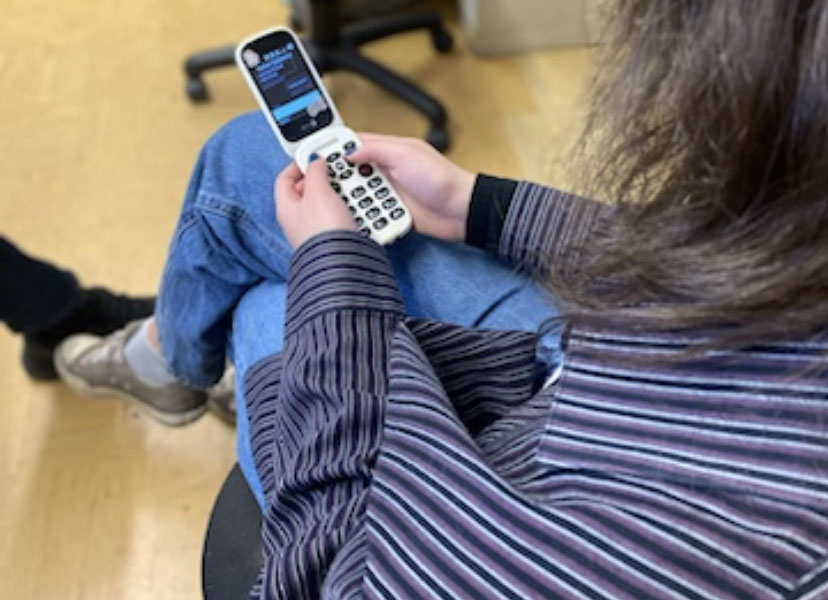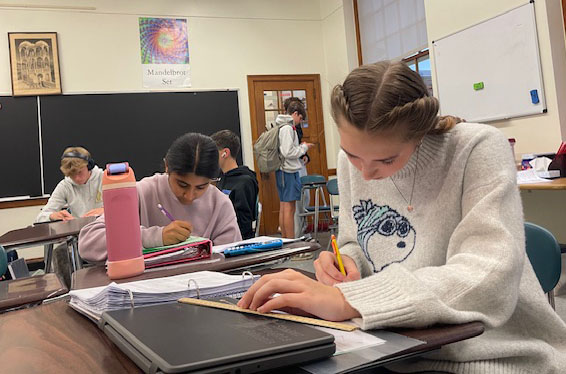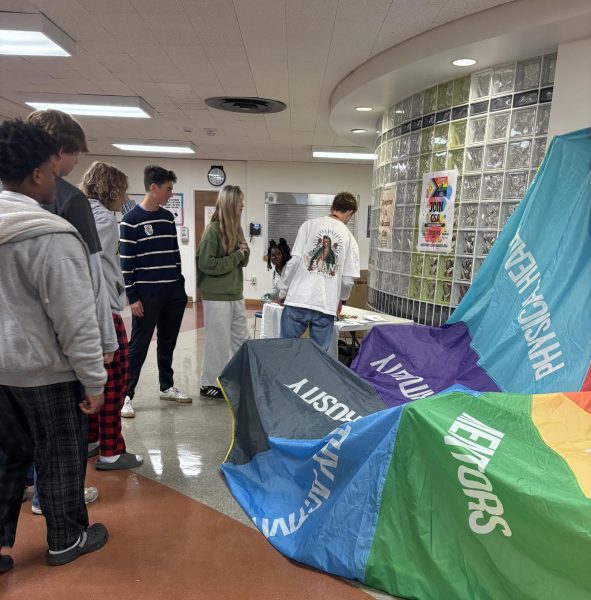Flipping My Habits
What I learned by living one week without a Smartphone
I relied on my 2018 Consumer Cellular flip phone for a week, and my head did not explode.
I was 11 years old when I got my first phone.
It was not what I was expecting. At all.
Clunky. Unfashionable. Embarrassing. These words came to my mind when I unboxed my Consumer Cellular flip phone.
The packaging exclusively featured images of elderly people, which spoke for themselves. I was too ashamed to bring my phone to school, which defeated the purpose of owning it: communicating with my parents. When I got an iPhone for my twelfth birthday, I left my flip phone at the bottom of my junk drawer, forgotten and collecting dust.
That’s why my friends and family were shocked when I chose to go smartphone-free for a week. “Why would you do that?” my best friend demanded after I told him my plan. It was hard for him to understand my motives in a society that is so dependent on smartphones.
Why would I forsake my phone? I blame an article in the New York Times.
The article is about a group of teenagers in Brooklyn who meet weekly to ditch their phones. Instead of scrolling, they do activities such as reading, painting and enjoying the outdoors. “When I got my flip phone, things instantly changed. I started using my brain,” one teen said. After reading the article, I thought about my own smartphone use. I spent a lot of time on my phone, which is the norm among teenagers.
According to Pew Research Center, 95 percent of teens had access to smartphones and 46 percent of teens were online “almost constantly” in 2022. Both statistics had increased from 2014-15 research by Pew Research Center, which found that 88 percent of teens had access to smartphones and 24 percent were online “almost constantly.”
I questioned if my smartphone was improving my life. From setting alarms to buying clothes, it made everyday tasks convenient, and I could connect with similar people online. For example, I am passionate about writing, and my phone enabled me to engage actively with others on forums for young writers.
However, social media damaged my self esteem by worsening my tendency to compare myself to others. A lot of users I encountered used filters and makeup, which made me feel like my looks were inadequate. Additionally, I was often tired during the day because I stayed up past midnight scrolling on TikTok or watching YouTube. According to an article published in the National Library of Medicine, smartphone use is correlated with stress, anxiety, depression, low emotional stability and sleep deficits.
Before I began my experiment, I ensured that my flip phone worked. I was worried because if it didn’t turn on, my entire plan would fall apart. Thankfully, the screen lit up. I noticed the wallpaper first. It was a photo of my Chromebook screen displaying fan art from “The Dragon Prince,” a cartoon that I watched back in sixth grade.
I discovered that my flip phone was a time capsule of my hobbies, interests and friendships in 2019. The photo gallery included terrible memes, candid pictures of my friends, and selfies in which I look shockingly young. My flip phone only had a back camera, so whenever I took photos of myself, I couldn’t see how they were going to turn out. Even as I cringed at my old self, I enjoyed the nostalgia for my preteen years.
I started my smartphone fast on March 18 at midnight. I immediately felt anxious, which suggested that my prior smartphone use was unhealthy. Not all smartphone dependence is bad. “If you are using it as a distraction because you are stuck in this moment and you can’t get by, that’s OK,” SHHS school psychologist Mallory Bendezu said. However, I wasn’t using my smartphone as a coping mechanism in distressing situations, I was using it constantly. Bendezu said that people should not use smartphones as their only coping strategy.
Sleeping was surprisingly easier throughout the week. I used to fall asleep with music in the background, believing that it was helpful. I was wrong. I felt more relaxed and able to think clearly with less background noise. I enjoyed hearing the wind rustling leaves outside.

I took my sister to the library the next morning. Then, I passed time by reading Oriah Mountain Dreamer’s “The Invitation,” a book based on one of the author’s poems. It has good messages, but the source material was stretched too thin, making it repetitive. I would rate it a two out of five.
My first challenge came that afternoon. My friend and I had bought tickets to the Theater Department’s production of “Spongebob: The Musical.” I couldn’t access mine, though, because it was a digital QR code. I had no plan for how I would get in.
Thankfully for me, archaic methods of verification were still available. I confirmed my ticket purchase with my last name, but that was inconvenient. I learned that navigating the modern world is harder without a smartphone. “So, cell phones are a thing. They’re not going anywhere. We are completely dependent on them,” global studies teacher Victoria Berndt said. According to Statista, “In 2022, approximately 89 million smartphone users in the United States scanned a QR code on their mobile devices, up by 26 percent compared to 2020.”
Getting through the school day without my smartphone was easier than I expected. I wasn’t bored. Unable to text people all day, I concentrated better on my schoolwork and face-to-face conversations. “Students who can get off the phone and put cognitive effort towards the learning process without the distraction have better grades, get into better schools,” Berndt said. “If someone cannot go extended periods of time without it, that is a concern.”
Some of my peers liked my flip phone. They asked me if they could hold it, take pictures and send text messages. One of my friends said that she wanted a flip phone “for the aesthetic.” I was shocked; people used to ridicule me for that phone. Oh, how the tables have turned! As expected, some rudely remarked about my choice to not use a smartphone. I asked Bendezu why some teenagers react negatively to nonconformity.
“We have a tendency to do what’s called ‘othering,’ ” said Bendezu. ” ‘I’m going to put labels on you, and I’m going to push you over there.’ Especially in the teenage years.” According to her, teenagers can feel like all eyes are on them, even though that is usually untrue. That makes it comfortable to direct negative attention to someone else.
Completing homework after school was easier without constant distraction. After I finished it, I spent most of my free time reading and writing. I felt like I was getting more value out of my days than before. When I used my smartphone, I would get stuck scrolling on TikTok or Instagram for hours. At times I didn’t even enjoy social media, but it was too addicting to put away.
I had fewer negative thoughts about myself without social media. “Everyone is looking at Instagram and these influencers. They have money for days, their houses are amazing, and it’s not attainable, and it’s not necessarily realistic,” Bendezu said. I felt less pressured to look, act and think a certain way. I could just do the things that I enjoy. “Pressure to just be everything and anything all at one time because of social media and cell phone use is — it doesn’t allow teenagers to be teenagers,” Berndt said.
It’s not just researchers who are noticing the negative effects of smartphones. According to the National Education Association, smartphone bans in schools are on the rise. “In 2020, cellphone bans were in place in 76% of U.S. schools,” states an article from the NEA. The Akron City School District, which is less than an hour away from SHHS, has joined the trend. It launched a pilot program to ban phones in three schools: in grades six through 12 at Buchtel and East community learning centers and grades nine through 12 at Ellet High School.
Students are required to lock their phones in special pouches during the school day. “Locking up students’ phones during the day was aimed to combat two problems: distractions during class and student safety. Students have used their phones to arrange and film fights, and social media drama spills over into classrooms during the school day,” according to a Beacon Journal editorial.
Bendezu said such a ban could be beneficial at SHHS. However, she said, “I don’t know that we are in a place to create one. I cannot say definitively that it’s in the best interest of each student.” Some students with anxiety benefit from reaching out via text, and the amount of students with anxiety is increasing, according to Bendezu. Additionally, she said some parents want the ability to contact their children during emergencies.

I enjoyed unplugging for a week, but I won’t understate the difficulty of limiting one’s smartphone and social media use. In a 2022 Pew Research Center survey, 54 percent of teenagers said that giving up social media would be at least somewhat difficult.
According to CDC, the average screen time of teenagers 15-18 years old is 7.5 hours per day. “The vast majority of cellphone-using teens say their phone is a way to just pass time, with nine-in-ten saying they often or sometimes use it this way,” states a Pew Research Center report. In my opinion, people should strive for a happy medium. Smartphones should be used helpfully, not harmfully.
When I took my smartphone out of my drawer at the end of the week, I felt odd. I couldn’t believe that I had let such a small device occupy so much of my time. I’ve used what I learned about the ways my smartphone was harming me to improve my habits. Every night, I put away my phone when I need to go to sleep. I set aside time in my afternoons to read. When I am on the internet, I interact with friends and people with common interests instead of content that worsens my insecurities.
Bendezu said that teenagers should examine their schedules and determine if they’re leaving enough time for sleep, homework and self care. “We’re not getting the amount of sleep or quality of sleep we need. Especially for a rigorous schedule. I mean, you guys learn a lot. Learning is hard. Your brain needs a break,” Bendezu said. Those who struggle with self control can use their phone’s screen time settings to limit their use, she said.
Berndt said, “It is awesome, unless it controls your life.”
Comment using your Facebook, Yahoo, AOL or Hotmail account











